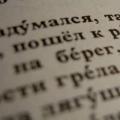Description
Fundamental and applied linguistics today is one of the innovative and sought-after specialties in which specialists in this field are trained. According to the curriculum, on the one hand, students study such traditional areas as their native and two foreign languages, as well as traditional theoretical linguistic disciplines (semantics, phonetics, syntax, morphology, etc.) and applied linguistic disciplines (general lexicography, technology text processing, etc.), and on the other – innovative computer linguistics. In addition, the curriculum includes mathematical disciplines, history, translation studies, and theoretical courses in ancient languages (Old Church Slavonic, Ancient Greek, Latin). Teachers teach students:
- speak freely and understand speech in the foreign language being studied, translate (written, oral, synchronously) and edit texts,
- use applied linguistic programs and telecommunication technologies,
- create intelligent systems,
- use linguistic technologies in the socio-political sphere,
- develop and improve electronic language resources and databases,
- engage in research activities and formalize its results in the form of articles and reviews,
- carry out linguistic examination of texts,
- optimize and create content for websites (both in Russian and in foreign languages).
Who to work with
Bachelors with a diploma in “Fundamental and Applied Linguistics” are in demand in many areas: both in academic science and in the field of information technology or in high-tech sectors of the economy. Young specialists can conduct scientific research in applied and theoretical linguistics, develop new methods of mastering a foreign language, electronic dictionaries and intelligent systems. After graduating from university, young people can get a job as a website administrator, translator (including simultaneous interpreter), foreign language teacher, Web developer, content manager, lexicographer, computer linguist, copywriter, linguist, editor, proofreader, linguistic expert, computer developer programs and databases, referent.
Language is one of the main means of understanding the world. With its help we learn, master culture, and communicate with others. Languages are studied by philologists who graduated from the university with a degree in linguistics. They can either teach at a school or university, or work as translators, study the history of the language, compile dictionaries, and much more.
Graduate philologist - who is he?
One of the most common misconceptions is that people who study at philological faculties are deliberately “assigned” to school. In fact, linguists are not necessarily teachers of Russian or English or translators.
A person who has graduated from the specialty “Linguistics” can and has the right to work:
- A teacher at a university or secondary educational institution.
- Translator.
- Secretary-referent.
- Do research work.
- Work in the field of artificial intelligence, especially if his specialty is applied linguistics.
- Engage in the development of educational software and electronic dictionaries, abstracting systems.
- Work as an editor or proofreader.
- Work in the field of journalism.
Where to study?
You already know what to do as a linguistics major, but which university is the best to study at?

It doesn't matter which educational institution you choose. Almost all of them work according to more or less similar programs. During the training, students study the history of language development, dialects, phonetics, spelling, grammar and syntax of the language, vocabulary, and stylistics. Depending on the chosen specialty, additional courses may be introduced. For pedagogical specialties, a course on language teaching methods is required, and for applied ones, the emphasis is on language statistics, and even mathematics.
In Russia, the following universities are considered the most prestigious:
- Moscow State Linguistic University.
- M. V. Lomonosov.
- Moscow State Humanitarian University named after M. A. Sholokhov.
- University of the Foreign languages
- UNIK Institute.

It is believed that the specialty “Linguistics” in the universities listed above is taught in the most in-depth and complete manner, and graduates themselves can later count on working in research institutes and laboratories, and work as translators in embassies and government services. But it is important to remember that not only the university, but also the grades in your diploma, your knowledge, influence the possibility of getting a job in a prestigious firm or company.
Areas of training
Studying at the chosen university can take place in the following ways:
- Philology.
- Linguistics - both fundamental and applied.
- Translation from any language. Moreover, not only people who know English and German, Chinese, but also even Slavic languages such as Polish and Czech are in demand.
Negative and positive aspects of the profession
The advantages of the specialty “Linguistics” include the following:
- Demand in the labor market.
- A high level of language proficiency, especially a foreign one, is a big plus, which further promotes career growth.
- There is always the opportunity to earn extra money on the side.

- Low level of payment in a number of regions.
- Quite boring and monotonous work.
- In the case of teaching, a graduate of the specialty “Linguistics” may encounter a problem: excellent knowledge of the language with minimal teaching skills.
- Unstable work, especially for translators.
In general, the graduate, if he, of course, studied, has very bright prospects.
Quite often on forums you can find the topics “Specialty “Linguistics”: who to work with?” Reviews show that graduates are quite willing to answer questions and advise on areas of work.
Often, philologists work not only at their main place (for example, in a translation agency or magazine, at a school), but also earn extra money through private language lessons, develop and sell their own programs for learning languages, are freelance journalists for magazines and newspapers, and earn extra money as copywriters.
In general, the profession is suitable for people with a humanitarian mindset, who have patience, love to read and research, and analyze certain processes occurring in language.
Today, fundamental and applied linguistics is one of the most popular and innovative specialties. Students study their native and foreign languages, traditional linguistic sciences (semantics, syntax, morphology, phonetics, etc.), as well as applied linguistic disciplines, innovative computer linguistics. In addition, the curriculum includes mathematical sciences, translation theory, history, and theoretical courses in ancient languages. Thus, students gain knowledge that in the future will help them become true professionals in their field.
How can graduates who have received a diploma in the specialty “45.03.03 Fundamental and Applied Linguistics Bachelor’s Degree” work? It is worth saying that they will be in demand in various fields, because they can teach, translate, write and edit texts. Young specialists can devote themselves to research activities in theoretical and applied linguistics. Lexicographer, translator, web developer, linguist, copywriter, linguistic expert, proofreader - this is an incomplete list of professions that graduates of the specialty Fundamental and Applied Linguistics can choose for themselves.
A special feature of this program is an in-depth study of linguistic theory and its application in various applied areas of modern linguistics, primarily in the field of information technology.
The area of professional activity of bachelor linguists includes two main areas: firstly, scientific research in the field of theoretical and applied linguistics, secondly, design and maintenance of various objects of linguistic technologies - electronic dictionaries, without data, control systems, expert systems, web -ontologies, search engines, machine translation systems, etc. Many graduates work in companies such as Yandex, ABBYY, Medialogy, Nanosemantics, etc.
Bachelor's training includes the study of several blocks of professional disciplines. First of all, bachelors-linguists receive in-depth training in the field of modern linguistics: the courses taught within this direction correspond to the basic levels of language and the main sections of linguistic science (introduction to linguistics, phonetics, morphology, syntax, semantics and lexicology, theory of text and discourse, language areas and typology of languages, psycholinguistics, sociolinguistics). Another cycle of disciplines is associated with mastering the methods and achievements of modern applied linguistics (introduction to computer linguistics, general and computer lexicography, text processing technologies, corpus linguistics). These courses are supported by knowledge in the field of mathematics, computer science and programming, which students acquire during the study of a block of mathematical disciplines (conceptual apparatus of modern mathematics, mathematical logic, probability theory and mathematical statistics, computer science and programming fundamentals).
In addition, the program includes the study of several languages. Students must practically master two foreign languages, the first of which, as a rule, is one of the eastern languages (Chinese, Japanese, Arabic, Korean, Persian, Hindi), and the second is one of the main Western European languages. The first language is studied for four years, the second - in the second to fourth years (classroom load for both foreign languages from 6 to 10 hours per week). In addition to the two main languages, students study Latin and Old Church Slavonic. A significant part of the curriculum consists of a variety of elective courses, during which students can choose their own scientific specialization, deepen their knowledge in the field of basic linguistic disciplines, study additional languages (for example, Sanskrit) and branches of linguistics (for example, dialectology)
The program is based on the rich human resources potential of the Institute of Linguistics. Among the developers and leading teachers of the program are the authors of basic textbooks on linguistic specialties - M.A. Krongauz (semantics), Ya.G. Testelets (syntax), the most famous specialists in our country in the field of semiotics and nonverbal communication (G.E. Kreidlin), theory of text and discourse (S.I. Gindin), grammar of oriental languages (V.I. Podleskaya, V.M. Alpatov), corpus linguistics (S.Yu. Toldova), etc.
Currently, there are many sciences that can be called the most important for humanity. Each of them made a huge contribution to the development of man and his capabilities; many discoveries were made that changed human life. In this light, some sciences, such as linguistics, are sometimes underestimated.
Many find it difficult to answer if you ask them what linguistics is for, what exactly it studies, etc. However, linguistics is primarily the science of our language, and language for us, without any doubt, is of paramount importance. This is what helps us contact other people, maintain social connections, and exchange information. Language is also of great importance for other sciences, because it helps to store and transmit information and use it for further research.
Another name for linguistics is a term that is more understandable to Russian people. Currently, fundamental and applied linguistics stands out as one of the main areas of development and study.
Universities pay special attention to this area; additional areas are being created in which fundamental and applied linguistics occupies one of the priority places in the training program. Now such specialists are in great demand in many areas of academic sciences, and they are also actively involved in high-tech
In the future, specialists in this field can conduct theoretical linguistics, including participating in many programs. The problems that fundamental and applied linguistics can solve are truly extensive and are not limited to any narrow circle.
There are also traditional areas in linguistics, which, however, have also received new development recently, this includes, perhaps, structural linguistics, as well as formal linguistics.
The traditional tasks of this science include the study of language in all its diversity; it is also designed to find effective mechanisms for preserving the native language, as well as recording all the changes occurring in it. This is simply necessary both for integrity and for understanding the mechanisms that occur in human society.
Language is of great importance for a person, because they say that when he begins to forget his native language, he loses a piece of himself, his soul, so in order for him to develop and live on, he must remember and honor his language.
However, from a scientific point of view, fundamental and applied linguistics solves slightly different issues. Recently, the emphasis has changed somewhat, because now knowledge of foreign languages has become in demand, so this science helps to develop methods that would be useful in mastering an unfamiliar language.
Based on the achievements of this science, intelligent systems are created, as well as various electronic dictionaries, which have become more popular recently. These advances have a profound impact, and progress requires not only technical knowledge, but also knowledge of man and his language. Only a combination of all these elements will help you achieve new heights and use your capabilities to their full potential. After all, as many say, if not limitless, then very wide.
Linguistic technologies confidently occupy leading positions in modern society, and technologies cannot do without what this modern science has to offer. Each of us encounters it and its achievements every day in everyday life. This is true.




